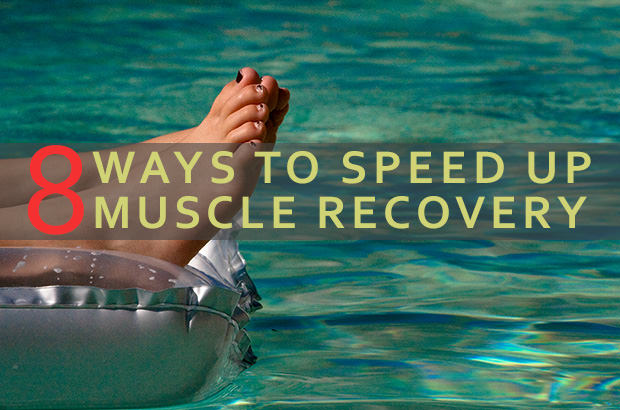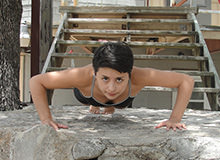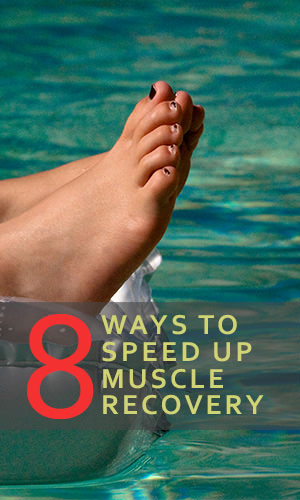
8 Ways To Speed Up Muscle Recovery
Posted on 26 Sep, 2018

Intensive workouts may sometimes cause tiny tears in the muscle fibers and connective tissues, causing you to feel sore and lose full range of motion in your limbs. With the right recovery techniques, you can speed up the time it takes to get primed for your next workout. Just follow the list below.
1.Warm down after your workout
During exercise, your heart beats harder and faster to supply blood to the working muscles. When the oxygen and nutrients are used up, your muscles push the blood back to the heart to get re-oxygenated and re-nourished.
At the end of physical activity, the muscles stops dialing in for more fuel. The heart slows and with it the force that pushes blood and waste products like lactic acids from the muscles. This process is often referred to as "blood pooling" and can cause swelling and pain.
A proper warm down keeps your blood circulating. This flushes your muscles of waste products, and brings fresh oxygen and nutrients to your muscles for rejuvenation.
Start out with shallow stretches and gradually increase the deepness of the stretch on each repetition.
2. Hydration
The aim of post-exercise hydration is to replace any fluid lost during your workout. Lean muscle tissue contains more than 75 percent water, so when the body is dehydrated, muscles fatigue is intensified.
Drinking plenty of water can also help flush out toxins and return your body to a proper pH level. An accumulation of toxins like lactic acid in the muscles are usually responsible for the next day soreness you feel.
Another important function of water is to cool the body, to bring it to a resting temperature for repair to take place.
3. Get a massage
A good deep tissue massage helps knead out the knots and improves blood circulation which in turn helps muscle repair. Massage also improves your range of motion by releasing the tightness in your body.
4.Use a foam roller
Besides getting a massage, you may also use a foam roller to break up knots and further release tension. A foam roller also helps breaks up scar tissue so you'll be ready to work out again sooner.
5. Go swimming
Light exercise during the recovery phase can stimulate blood flow to the muscles to help reduce muscle pain. Swimming is great because it helps open up the body and cures stiffness by getting all the joints moving through a full range of motion. The real beauty is that swimming provides gentle resistance without any damaging impact.
The breast stroke is great for working sore arm and leg muscles and the backstroke is good for working every muscle group in the body. Avoid more strenuous strokes like the butterfly. Swimming in saltwater is also therapeutic for sore muscles, so if you live close to a beach you may consider going for a dip.
6. Apply cold and hot compresses to sore, achy muscles
The heat works to alleviate pain, while the cold temperature helps to reduce swelling and inflammation of the muscles.
Alternatively, you can relax in a hot tub. Besides soothing the pain of sore muscles, getting into a hot tub relaxes your tissue and helps you feel ready to work out again much faster. The same goes for using a sauna, which loosens your body through heat therapy.
7. Get plenty of sleep
When the rate at which you are training exceeds the rate of repair and protein synthesis your body can handle, it will have problems rebounding to its full strength. Sleep is the time when your body repairs itself so be sure to get lots of it.
8. Consume the right foods
Foods That Are High In Potassium
Potassium is crucial to heart function and muscle contraction. Cramps and muscle soreness are the result when our potassium levels are depleted. Good potassium sources include bananas, oranges, melons, raisins, and potatoes.
High Protein Foods
Protein is the building block of muscle and is crucial in the repair of torn muscles. High protein foods include meat, eggs, legumes, beans, fish, leafy greens and dairy.
Vitamin C
It's essential for the restoration of collagen, which helps to rebuild muscle tissue that has been broken down. This powerful antioxidant is essential for the restoration of collagen--connective tissue that helps repair muscle tissue, tendons and blood vessels. Vitamin C also helps flush the muscles of lactic acid.
Photo Credits
Books Towards A Fitter YOU


by Trey Hall

by Alex Hutchinson

by Paul Wade

 Intelligent Ways To Lose Fat
Intelligent Ways To Lose Fat 10 Foods That Fight Fatigue
10 Foods That Fight Fatigue Breathing Tips For Running That Could Change Your Life
Breathing Tips For Running That Could Change Your Life 16 Secrets To A Happy Life
16 Secrets To A Happy Life










